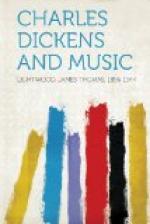There are at least three eighteenth-century ballads with Peg, or Lovely Peg, for the subject, and it is not certain which of these the Captain favoured. This is one of them:
Once more I’ll tune
the vocal shell,
To Hills and Dales my passion
tell,
A flame which time can never
quell,
That burns for
lovely Peggy.
Then comes this tuneful refrain:
[Figure 6]
Lovely Peggy, lovely Peggy,
Lovely, lovely, lovely Peggy;
The heav’ns should sound
with echoes rung
In praise of lovely
Peggy.
The two others of this period that I have seen are called ‘Peggy’ and ‘Lovely Peggy, an imitation.’ However, it is most probable that the one that the Captain favoured—in spite of the mixture of names—was C. Dibdin’s ‘Lovely Polly.’
LOVELY POLLY
[Figure 7]
A seaman’s love is void
of art,
Plain sailing to his port
the heart;
He knows no jealous folly,
He knows no jealous folly.
’Tis hard enough at sea to war With boist’rous elements that jar— All’s peace with lovely Polly, All’s peace with lovely Polly, with lovely Polly, lovely Polly, All’s peace with lovely Polly.
Dickens was very familiar with Dibdin’s songs, while the eighteenth-century ones referred to he probably never heard of, as they are very rarely found.
The worthy Captain enjoys a good rollicking song, preferably of a patriotic turn, but is very unreliable as to the sources of his ditties.
‘Wal’r, my boy,’ replied the Captain, ’in the Proverbs of Solomon you will find the following words, “May we never want a friend in need, nor a bottle to give him!” When found, made a note of.’
This is taken from a song by J. Davy, known as ’Since the first dawn of reason,’ and was sung by Incledon.
Since the first dawn of reason
that beam’d on my mind,
And taught me
how favoured by fortune my lot,
To share that good fortune
I still am inclined,
And impart to
who wanted what I wanted not.
It’s a maxim entitled
to every one’s praise,
When a man feels
distress, like a man to relieve him;
And my motto, though simple,
means more than it says,
‘May we
ne’er want a friend or a bottle to give him.’
He is equally unreliable as to the source of a still more famous song. When Florence Dombey goes to see him the Captain intimates his intention of standing by old Sol Gills,
’and not desert until death do us part, and when the stormy winds do blow, do blow, do blow—overhaul the Catechism,’ said the Captain parenthetically, ‘and there you’ll find these expressions.’
I have not heard of any church that has found it necessary to include this old refrain in its Catechism, nor even to mix it up with the Wedding Service.




